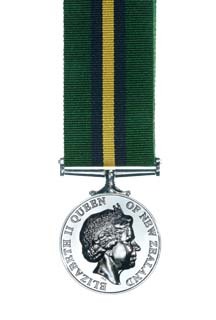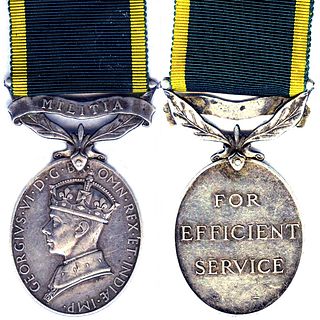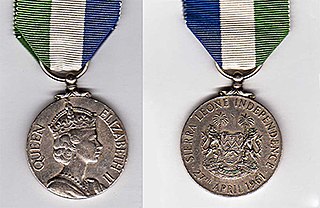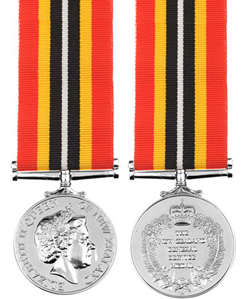
Prince Richard, Duke of Gloucester, is a member of the British royal family. He is the second son of Prince Henry, Duke of Gloucester and Princess Alice, Duchess of Gloucester, as well as the youngest of the nine grandchildren of King George V and Queen Mary. He is currently 31st in line of succession to the British throne, and the highest person on the list who is not a direct descendant of King George VI, who was his uncle. At the time of his birth, he was 5th in line to the throne, behind his cousins Princess Elizabeth and Princess Margaret, his father, and his brother. He is a paternal first cousin of Queen Elizabeth II.

The Governor-General of Solomon Islands is the resident representative of the Solomon Islands' monarch, currently Elizabeth II. The Queen does not reside in the country but appoints a Governor-General to act on her behalf, subordinate to her, for a five-year term. Although the office holds considerable reserve powers, it is largely a symbolic figurehead position with little day-to-day involvement in government.

The Queen's Service Medal is a medal awarded by the government of New Zealand to recognise and reward volunteer service to the community and also public service in elected or appointed public office. It was established in 1975 and is related to the Queen's Service Order. The QSM replaced the Imperial Service Medal as an award of New Zealand.
The Solomon Islands dollar is the currency of Solomon Islands since 1977. Its symbol is "$", with "SI$" used to differentiate it from other currencies also using the dollar sign. It is subdivided into 100 cents.
The Royal Victorian Medal (RVM) is a decoration established by Queen Victoria in April 1896. On 14 May 1912, King George V further confirmed the institution of the medal with an additional royal warrant. A part of the Royal Victorian Order, it is a reward for personal service to the Sovereign or the royal family, and is the personal gift of the sovereign. It differs from other grades of the order in appearance and in the way it is worn.

The monarchy of Solomon Islands is a system of government in which a constitutional monarch is the head of state of Solomon Islands. The present monarch is Queen Elizabeth II, who is also the head of state of fourteen other Commonwealth realms. Although the person of the sovereign is equally shared with 14 other independent countries within the Commonwealth of Nations, each country's monarchy is separate and legally distinct. As a result, the current monarch is officially titled the Queen of Solomon Islands and, in this capacity, she and other members of the Royal Family undertake public and private functions domestically and abroad as representatives of Solomon Islands. However, the Queen is the only member of the Royal Family with any constitutional role.

The New Zealand General Service Medal 2002 was a New Zealand campaign medal for service in the Solomon Islands. The medal was awarded for service during Operation Purple Haze 1 and 2, Operation Zephyr, and the International Peace Monitoring Team from 2000 to 2002 and with the Regional Assistance Mission to Solomon Islands (RAMSI) from 2003 to 2013.

The Rhodesia Medal was initiated by the British Government in consultation with Australia, New Zealand, Fiji and Kenya, whose forces took part in Operation AGILA,. The role of the multi-national force was to keep peace between 22,000 guerrilla fighters and the Rhodesian forces during the ceasefire and run-up to the 1980 elections.

The Efficiency Medal was instituted in 1930 for award to part-time warrant officers, non-commissioned officers and men after twelve years of efficient service on the active list of the Militia or the Territorial Army of the United Kingdom, or of the other Auxiliary Military Forces throughout the British Empire. At the same time a clasp was instituted for award to holders of the medal upon completion of further periods of six years of efficient service.

The Queen's Volunteer Reserves Medal (QVRM) was created by Royal Warrant of Queen Elizabeth II on 29 March 1999. Only 13 Queen's Volunteer Reserves Medals may be awarded in a year. The medal is presented only to members of the Volunteer Reserves of the British Armed Services for exemplary meritorious service in the conduct of their duties. The QVRM is a Level 3 award and ranks in military order of wear immediately after the British Empire Medal. It is the first exclusive award to Volunteer Reserves that is presented at an investiture. The first awards were announced in the 1999 Queen's Birthday Honours with these first awards presented at an investiture on 5 November 1999.

The Uganda Independence Medal was authorised by Queen Elizabeth II on the occasion of the granting of independence to Uganda to give recognition to individuals of the Armed Forces, Police Force and Local Government. Members of the military and police serving on 9 October 1962 and civil servants, local government employees and other residents of Uganda who have rendered outstanding public service.

The Sierra Leone Independence Medal was authorised by Queen Elizabeth II on the occasion of the granting of independence to Sierra Leone, to give recognition to individuals of the Royal Sierra Leone Military Forces, Sierra Leone Naval Volunteer Force and the Police Force who were serving on the 27 April 1961. Members of United Kingdom Land Forces seconded to the Royal Sierra Leone Military Forces also qualified.

The New Zealand General Service Medal 2002 (Timor-Leste) is a New Zealand campaign medal for service in Timor-Leste during and after the 2006 East Timorese crisis between 28 April 2006 and 31 December 2012.

Haakon VII 70th Anniversary Medal is a Norwegian military award, which was instituted by King Haakon VII of Norway on 27 October 1942. It was awarded in recognition of military personnel who served in the Norwegian armed forces in Britain on the 70th birthday of Norwegian King Haakon VII. The medal ranks 33rd in the Norwegian decoration order of precedence.

The Queen's Medal for Chiefs is an award of the British Empire. The medal was established in 1920, during the colonial period. The medal was granted to the chiefs within the numerous African, Asian, American and Pacific colonies and mandated territories that made up the then very extensive British Empire. The medal is no longer awarded.

The New Zealand Meritorious Service Medal is a meritorious and long service award for members of the New Zealand Defence Force. Initially established on 28 April 1898 as the Meritorious Service Medal, only members of the New Zealand Army were eligible for award. In 1985, a Royal Warrant established the current criteria for the medal making all members of the Army, Navy, and Air Force eligible for the award. Members of the defence forces above the rank of sergeant, who have at least 21 years of service, and hold their service's Long Service and Good Conduct Medal are eligible for the medal. The New Zealand Meritorious Service Medal is to be replaced by the New Zealand Defence Meritorious Service Medal, though holders of the superseded medal are still entitled to continue wearing it.
The Long Service and Good Conduct Medal is a military award recognizing 15 years of exemplary and unblemished service by non-commissioned and other ranks members of the New Zealand Defence Force. Established in 1985, these medals replaced the British Long Service and Good Conduct Medals with specific versions for New Zealand. There are three version of the Long Service and Good Conduct Medal, one each for the New Zealand Army, Royal New Zealand Navy, and the Royal New Zealand Air Force.

The Colonial Prison Service Medal was established on 28 October 1955 as a long service medal of the United Kingdom and the Commonwealth. On 10 April 2012 the medal became known as the Overseas Territories Prison Service Medal, and underwent a minor change in design. This reflected the change in the way Britain's remaining colonies were described, they having been classed as 'Overseas Territories' from 2002.

The Jersey Honorary Police Long Service and Good Conduct Medal is a decoration for members of the Honorary Police of the Bailiwick of Jersey. First instituted by Royal Warrant on 1 December 2014, it is an official award that can be worn alongside other British medals and decorations.

A number of new Sierra Leonean medals were instituted in the decade from 1961, when the country gained independence.

















